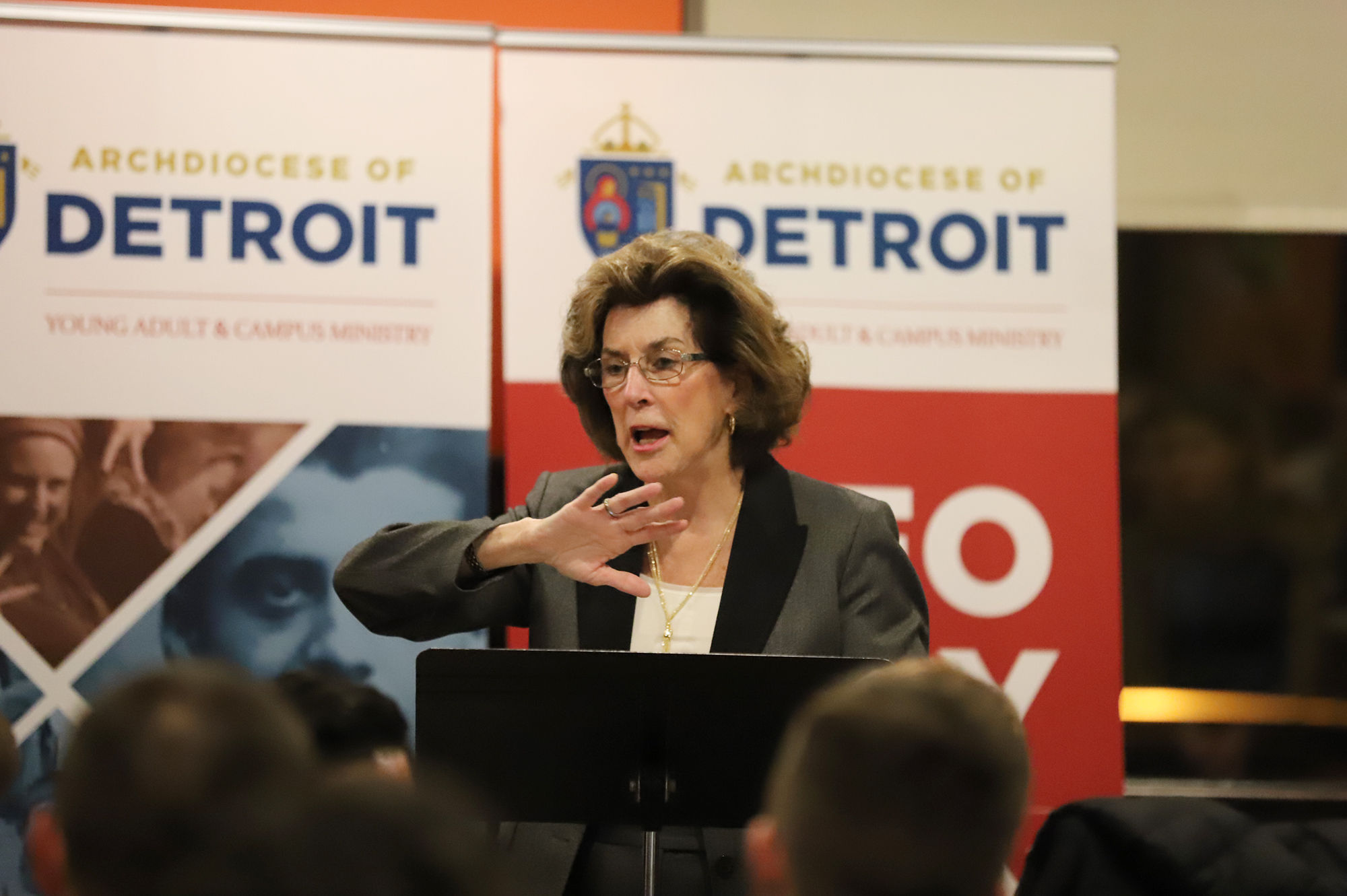Dr. Patricia Cooney Hathaway speaks to approximately 60 young adults during Theology on Tap
ROYAL OAK — On Jan. 21, Dr. Patricia Cooney Hathaway, professor of spirituality and systematic theology at Sacred Heart Major Seminary, spoke to more than 60 young adults at the Theology on Tap event held at the Royal Oak Taphouse.
The event was organized by Patrick Howard, young adult and campus ministry coordinator for the Archdiocese of Detroit. He believes these types of events are important in helping young people embrace their Catholic faith in a comfortable environment.
“Theology on Tap provides a shallow entry opportunity for young adults and a better understanding and knowledge of different aspects of the faith and hopefully encourages them to grow deeper in it,” Howard said.
As Dr. Cooney-Hathaway spoke, the packed room spent an hour entranced by her overview of St. Teresa of Avila’s “interior castle” and the saint’s method of prayer and contemplation.
When St. Teresa wrote her book on prayer, she had no idea where to begin, Dr. Cooney-Hathaway said. She was inspired by the image of a castle and how heaven is similar in that there will be multiple dwelling places inside. Her prayer analogy has seven mansions within the castle, and each mansion draws a person closer to God and towards transforming union.
Dr. Cooney-Hathaway described it as a transition from silkworm to butterfly: “Let it [the silkworm] die so that the butterfly can be born. Let your false-self die so that your true-self can be born.”
Jesus wants everyone to have an enriched friendship with him, St. Teresa taught, and the main way to build this relationship and strengthen this love is through habitual prayer and listening to God’s words as described in the fifth, sixth, and seventh mansions, Dr. Cooney-Hathaway said.
During Dr. Cooney-Hathaway's talk, the speaker system repeatedly malfunctioned, but that only served to enhance the poignancy of her message, which was about the need for silence, said Deacon Mark Tibai, a transitional deacon serving at St. Mary Parish in Royal Oak and one of Dr. Cooney-Hathaway's former students.
“It was interesting to have the noise from the other side of the bar as she talks about the need for quiet,” Deacon Tibai said. “You had to focus and pay attention, or you would miss something important.”
Taking from St. Teresa, Dr. Cooney reflected that, “Prayer is nothing else than an intimate sharing between friends. It means taking time frequently to be alone with Him whom we know loves us.”
That means taking time out of a busy schedule to be in communion with God, Dr. Cooney-Hathaway said. There is always time for prayer, even if only five or 10 minutes in the morning, she said. Once talking to God becomes a habit, it will be easy to find time for conversation with God, and then a natural progression to find the silence and unity of listening to what He has to say back.
The mind is like any other muscle in the human body, Dr. Cooney-Hathaway said, and must be strengthened through a conscious effort to give time to God each day.
“The spiritual life is not knowing about God, but actually coming to know God,” said Zaid Chabaan, a fourth-year theology seminarian at Sacred Heart Major Seminary. “It was helpful to see so many people (at the Theology on Tap) ... it helped me to recognize the hunger and thirst for God which exists in the lives of so many.”
Dr. Cooney-Hathaway concluded her talk with a famous quote from St. Teresa that sums up the univeral calling to strive for sainthood and to be like Christ unto others:
“Christ has no body now but yours. No hands, no feet on earth but yours. Yours are the eyes through which he looks compassion on this world. Yours are the feet with which he walks to do good. Yours are the hands through which he blesses all the world. Yours are the hands, yours are the feet, yours are the eyes, you are his body. Christ has no body now on earth but yours.”
This story originally appeared in Mosaic, the online and print magazine of Sacred Heart Major Seminary, and is republished with permission. Its author, Katherine Tibai, works in the seminary's Development and Mission Advancement Office.








